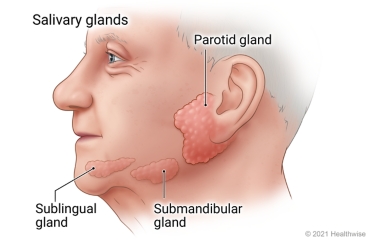Overview

Salivary glands make saliva, or spit. An infection in these glands can make the glands swell and hurt.
An infection can happen when bacteria gets into the gland. This is more common in people who have diabetes, poor tooth care, or stones in these glands. Bacteria can build up and cause an infection if you don't get enough fluids. It can also happen if the flow of saliva gets blocked by a small stone in the gland. A virus can also cause an infection.
Your care depends on the cause. If the problem is caused by bacteria, your doctor may prescribe antibiotics.
Home treatment may help. You can drink more fluids or suck on sugar-free lemon drops to increase the flow of saliva.
Follow-up care is a key part of your treatment and safety. Be sure to make and go to all appointments, and contact your doctor if you are having problems. It's also a good idea to know your test results and keep a list of the medicines you take.
How can you care for yourself at home?
- If your doctor prescribed antibiotics, take them as directed. Do not stop taking them just because you feel better. You need to take the full course of antibiotics.
- Ask your doctor if you can take an over-the-counter pain medicine, such as acetaminophen (Tylenol), ibuprofen (Advil, Motrin), or naproxen (Aleve). Be safe with medicines. Read and follow all instructions on the label.
- Do not take two or more pain medicines at the same time unless the doctor told you to. Many pain medicines have acetaminophen, which is Tylenol. Too much acetaminophen (Tylenol) can be harmful.
- Drink plenty of fluids. If you have kidney, heart, or liver disease and have to limit fluids, talk with your doctor before you increase the amount of fluids you drink.
- Put an ice or heat pack (whichever feels better) on the swollen jaw for 10 to 20 minutes at a time. Put a thin cloth between the ice or heat pack and your skin.
- Suck on ice chips or ice treats such as sugar-free flavored ice pops. Eat soft foods that do not have to be chewed much.
- Use sugar-free gum or candies such as lemon drops. They increase saliva.
- Avoid over-the-counter medicines that can give you a dry mouth. These medicines include antihistamines, such as diphenhydramine (Benadryl) or chlorpheniramine (Chlor-Trimeton).
- Gently massage the infected gland.
When should you call for help?
Contact your doctor now or seek immediate medical care if:
- You have symptoms of infection, such as:
- Increased pain, swelling, warmth, or redness.
- Red streaks leading from the area.
- Pus draining from the area where the saliva enters the mouth.
- A fever.
- You have new pain, or your pain is worse.
Watch closely for changes in your health, and be sure to contact your doctor if:
- You are not getting better as expected.
Where can you learn more?
Go to http://www.healthwise.net/patientEd
Enter F122 in the search box to learn more about "Salivary Gland Infection: Care Instructions".
Current as of: October 27, 2024
Author: Ignite Healthwise, LLC Staff
Clinical Review Board
All Ignite Healthwise, LLC education is reviewed by a team that includes physicians, nurses, advanced practitioners, registered dieticians, and other healthcare professionals.

